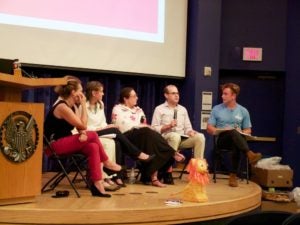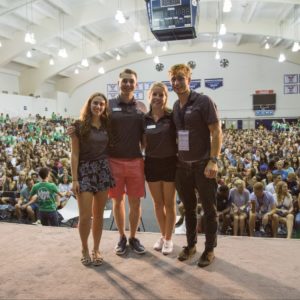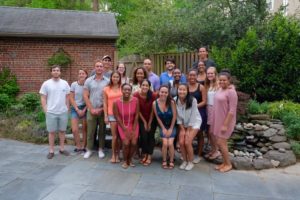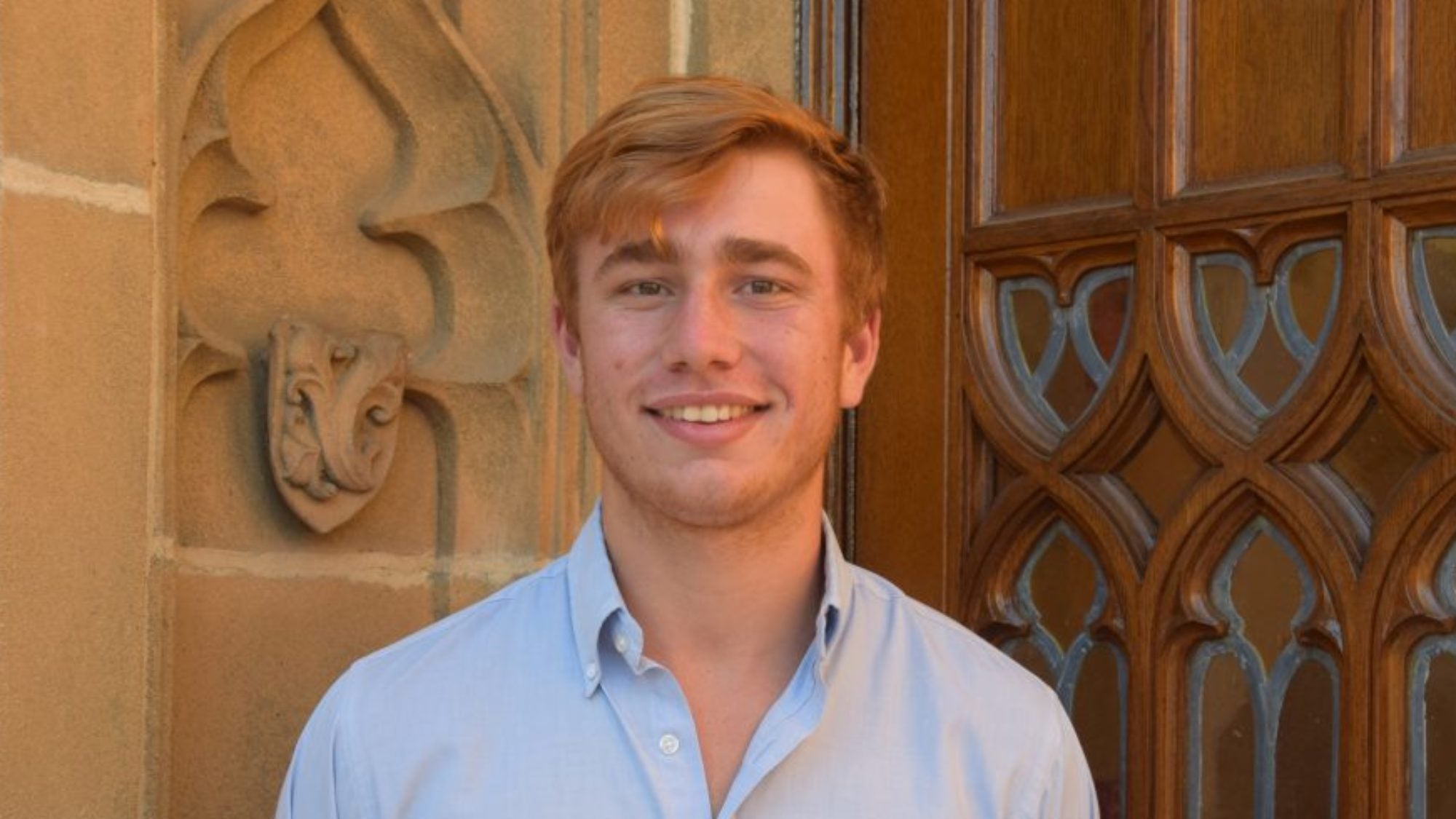Isaiah Fleming-Klink (SFS’19) has focused his studies in the Walsh School of Foreign Service on the multifaceted challenges faced by urban communities across the United States.
“The two issues I’m most passionate about are criminal justice and housing policy, and, particularly, the intersection of the two,” Fleming-Klink says.
First learning about the classroom-to-prison pipeline while in middle school, he has since become increasingly concerned about links between the prison system, housing policy, and historic systems of racial oppression in the U.S.
“I’m of the belief that housing has been the most powerful tool and manifestation of racism in the country,” Fleming-Klink says. “One cannot understand the foundations of poverty—education, disparate environmental impacts, and access to health care, jobs, and other social services—delinked from an understanding of racial zoning, racial covenants, redlining, urban (‘Negro’) removal, destructive construction of highways and interstates, and contemporary housing policies.”
Gaining a Global Perspective

Fleming-Klink grew up in Richmond, Va. He began forging a connection with the greater international community while in high school, when he had the opportunity to spend a summer in Ghana and travel to China for a few weeks during his senior year. He also participated in a semester program in Washington, D.C. called the School for Ethics and Global Leadership.
“These experiences not only made me excited to keep traveling and seeing the world, but made me curious to understand the forces behind and undergirding the political, social, cultural, and economic situations and realities I experienced abroad,” Fleming-Klink says.
When exploring his options for college, Fleming-Klink knew he wanted to dive deeper into this realm and gain a comprehensive understanding of issues facing communities across the globe. The SFS provided the perfect environment for him to do so, with both a strong academic tradition and a strategic location in Washington, a hub of domestic and international politics.
“When I was deciding on where I wanted to apply to college, Georgetown and the SFS specifically seemed a natural fit to keep thinking through the kinds of international political questions I was starting to think about in high school,” Fleming-Klink says.
Within the SFS, Fleming-Klink is a Culture and Politics (CULP) major, focusing on issues of comparative urban public policy. He emphasizes how the CULP major pushes students not only to pursue knowledge, but also to apply this knowledge to contemporary issues and the real communities impacted.
“CULP is simultaneously the most broad, amorphous major in the SFS and the one with the most specific mandate towards understanding a specific intersection and helping those affected by it,” Fleming-Klink says.
From an academic standpoint, he appreciates the liberty that CULP gives students in gaining a nuanced understanding of their particular interest by pulling theory and applications from multiple departments.
“CULP challenges me to examine issues of policy through a multidisciplinary and multi-faceted lens that incorporates history, economics, religion, culture, and sociology,” Fleming-Klink says.
Making Connections
Fleming-Klink has benefited from building relationships with faculty and mentors at Georgetown who have pushed him to challenge and develop his beliefs. Among these mentors are Dean Samuel Aronson, his academic dean before he declared a major, who helped Fleming-Klink adjust to life on the Hilltop and continues to be an important resource for him.

Fleming-Klink has also greatly appreciated learning from sociology Professor Brian McCabe, Professor Albert Pierce, who taught his “Ethics in Literature” proseminar, and Professor Marc Howard. These professors have not only shaped him as a student, but particularly in the cases of Professor McCabe and Professor Howard, have helped guide him towards potential career paths.
Professor Howard’s “Prison Reform Project” class proved to be especially valuable, providing a real-life opportunity to engage with issues he cares about. In this class, Fleming-Klink had the opportunity to get to know six returning citizens from the D.C. area and create documentaries that illustrate their struggles within the reentry process.
“I worked specifically with a woman named Gerita who lives in Baltimore and spent over 35 years in and out of prisons and jails,” Fleming-Klink explains. “She never ceases to amaze me in her dedication to others, her compassion and love for those around her, her vulnerability and honesty, and her optimism that things will get better.”
This semester, Fleming-Klink is taking “Music in U.S. Prisons,” taught by Professor Ben Harbert. Every week students take a class with 15 incarcerated individuals in a D.C. jail.
“This work, too, tethers its focus to the humanity and compassion of all people, but especially those who’ve been marginalized and oppressed in this country historically and contemporarily,” Fleming-Klink says.
Outside the Classroom
Fleming-Klink has also grown from the relationships he’s built with friends outside of the classroom.
“My friends constantly force me to think through why it is I do the things I do—contemplation in action—and push me to use the tools at my disposal here to improve the lives of those around me, at Georgetown, in D.C., in the U.S., and in the world whenever and however I can,” Fleming-Klink says.

Fleming-Klink has been highly active in student life on the Hilltop, serving as Coordinator and Director of Staff Development for New Student Orientation this past academic year. He is also part of the Carroll Fellows Program, a tour guide for Blue and Gray, an employee in the Corp, and was a columnist for The Hoya and The Georgetown Voice.
He has participated in several Alternative Break Programs through Georgetown’s Center for Social Justice, which have allowed him to travel across the country—to New York City, Baltimore, Selma, Montgomery, Birmingham, and soon Chicago—to witness first-hand issues faced by these communities.
“These programs have not only introduced me to topics ranging from community gardening to corporate mortgage financing, but introduced me to some of the brightest and most empathetic students that Georgetown has to offer,” Fleming-Klink says.
Fleming-Klink has also taken every opportunity to break the “Georgetown bubble” and engage with the greater D.C. community.
“Beyond being the site of incredible internship and pre-professional opportunities, D.C. has been a great place to engage with others and build community,” Fleming-Klink says. “I constantly explore neighborhoods, restaurants, coffee shops, museums, and historical sites both with friends and alone on my bike.”
Beyond the Hilltop
Beyond Georgetown, Fleming-Klink has pursued internships that have provided him with opportunities to explore potential career pathways and further develop his interests. Last summer, he interned for ONE DC, an organization focused on housing and poverty issues. He collected data from residents on lawsuits and learned about the issues faced by tenants across the city.
“ONE DC’s work is centered around the needs of low-income and black communities in D.C., and that focus really helped me understand how the work I’m interested in doing needs to be led by those most affected,” Fleming-Klink says.

Last semester, he interned with the National Low Income Housing Coalition (NLIHC), an organization that conducts research and advocates for affordable housing policy at the national level.
“In a lot of ways, my experiences with NLIHC and ONE DC really balanced each other out: through NLIHC, I was able to help do research and analyze data, advocate policy on the Hill, and write resources that went out to tenants across the country,” Fleming-Klink says.
Next summer, Fleming-Klink plans to either remain in D.C. to conduct research in Landlord-Tenant Court for his senior thesis or intern with the Bronx Defenders in New York City. For the more distant future, he is unsure what specific career path he wishes to pursue.
“I know I want to continue working with folks ensnared in our criminal justice system or working towards creating policies that preserve and create affordable housing, but I don’t necessarily know if I want to go into indigent defense, academia, think tank work, or social services to achieve those ends,” he says.
Fleming-Klink knows that wherever the future brings him, his broader goals have been undoubtedly shaped by his experiences at Georgetown, the classes he has taken, and the relationships he has built with peers and mentors.
“My studies in the SFS and in CULP are the very foundation of the goals I have moving forward,” Fleming-Klink says. “As far as I’m concerned, a SFS education is about being exposed in an interdisciplinary way to contemporary and historical issues that affect the lives of real people, grappling with those issues with one’s peers and mentors, trying to understand them through a whole host of different lenses, and, ultimately, using one’s SFS degree to engage more deeply with whatever issue or set of issues that most speaks to you.”
